Here are all your rights if you are bisexual
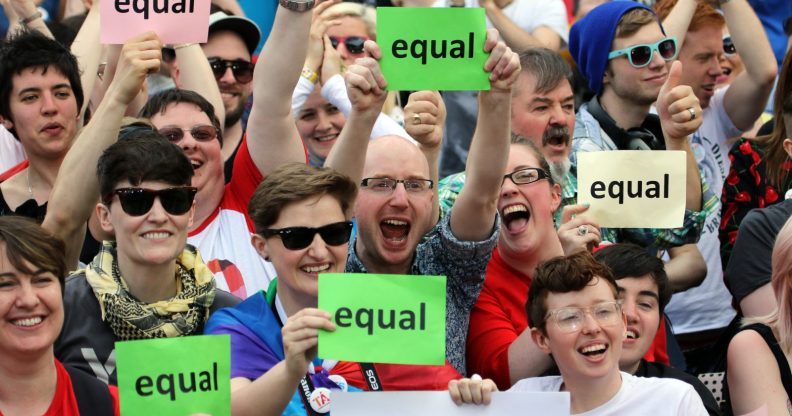
Supporters for same-sex marriage wait for the result of the referendum at Dublin Castle on May 23, 2015 in Dublin. (PAUL FAITH/AFP/Getty)
Bisexuals have a hard enough time as it is as their culture is commonly misunderstood in the mainstream, arguably more than gay or lesbian culture.
There is a stereotypical image of bisexual people as ‘greedy’, wanting the best of both worlds – which is obviously unkind and untrue.
Fortunately, bisexual people do have legal rights for protection.
They can now marry whoever they want, of whichever gender in England, Scotland and Wales.
Northern Ireland is currently the only part of the UK that continues to ban same-sex marriage, due to opposition from the ultra-conservative Democratic Unionist Party.
Therefore, rather than going through LGBT rights in the UK as a whole, we’re looking at rights for the bisexual community in England, Wales and Scotland first. We’ll cover Northern Ireland separately at the bottom of this explainer, and will state clearly where the same rules apply.
Read on for more on civil partnerships, marriage, benefits, taxes, adoption, surrogacy and the rest.
Civil partnerships and marriage
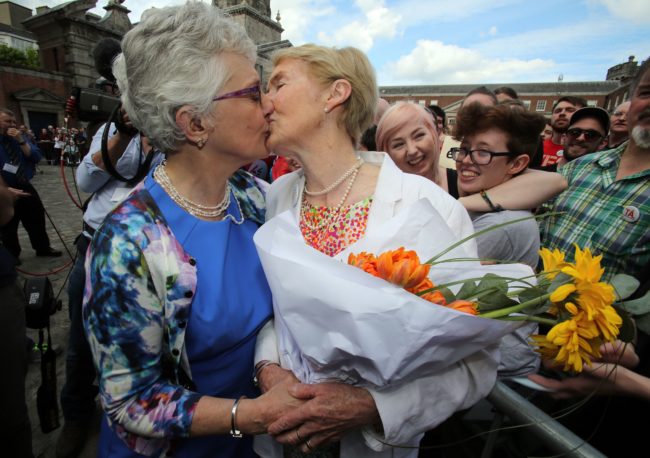
(Getty)
Related: Straight people think bisexual women are more promiscuous and neurotic, study finds
Same-sex couples are able to get married or have a civil partnership in England, Scotland and Wales.
Marriages are traditionally formed by saying a predetermined set of words, whereas for civil partnerships there is no obligation on the wording used. A civil partnership is formed by signing a civil partnership document.
For both marriages and civil partnerships, couples will need a registrar and two witnesses.
The minimum age for any person wishing to enter a marriage or civil partnership in England and Wales is 16 years old, and anyone under the age of 18 needs to get written permission from their parents or guardian.
In Scotland, you don’t need parental consent if you’re aged between 16 and 18.
However, it is not currently possible for same-sex marriages to be conducted by or in the premises of the Church of England, or the Church in Wales.
The Marriage (Same Sex Couples) Act 2013 does make it possible for any other religious organisation who wishes to conduct same sex-marriages to do so.
In Scotland, same-sex marriages can be performed by registrars and by religious and belief bodies.
If you want your marriage performed by a religious or humanist celebrant, you need to contact them first and then contact the registry office about submitting notice.
You also need to contact the person performing your civil partnership before completing the notice of civil partnership if you are having a religious or belief celebrant.
Same as opposite-sex couples, the married or civil partnered pair will be issued with a certificate of marriage or certificate for a civil partnership.
These are all that are needed to show a name change if one person changes their surname to their partner’s.
However, if the couple want to double-barrel, merge or change their surname to something different, it’ll need to be done through Deed Poll.
Converting a civil partnership

(Weddbook)
Couples who registered a civil partnership in England and Wales have been able convert this to marriage since 10 December 2014., whereas in Scotland it has been possible from December 16 2014.
It’s a simple process, and couples can hold a ceremony if they want to.
They will receive a marriage certificate, and the date of their marriage will be backdated to the date of their civil partnership. The date of conversion will appear too.
Dissolution and divorce
Much like straight couples, same-sex couples sometimes decide to call it quits.
Married couples need to apply for a divorce, while those in civil partnerships need to apply for a dissolution. In the eyes of the law, same-sex divorces are the same as opposite-sex divorces and the process works in the same way.
On the granting of a divorce or dissolution for a same-sex couple, the division of income and capital will be resolved in the same way as with opposite-sex couples.
And, when a divorce or dissolution is granted, each partner’s status in relation to their child remains the same.
Therefore, if the child was jointly adopted by the couple, they will both remain legal parents.
The same goes for those who have used donor insemination – ie a wife or civil partner who is treated as a legal parent will be responsible for the child. (More on that old caper further down.)
Related: Riverdale will have a bisexual sex scene soon, show’s writer reveals
AdoptIng a child

(Pexels)
In November 2002, the Adoption and Children Act passed into law. It allowed unmarried couples, gay and straight, to apply for joint adoption for the first time and the Act came into effect on December 30 2005.
Lesbian, gay, bi and trans people are protected from discrimination under the Equality Act 2010.
This means an adoption agency must assess you fairly, using the same criteria they use for heterosexual people. They cannot turn down an adoption application just because the person is LGBT+.
In Northern Ireland, adoption by unmarried and LGBT couples was legalised after rulings by the High Court in 2012 and the Court of Appeal in 2013 found that the ban on same-sex couples adopting was a breach of human rights.
Surrogacy
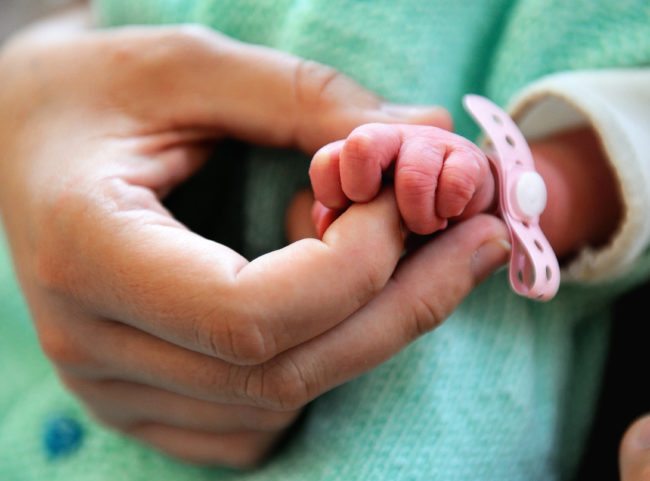
(Getty)
Commonly used by male same-sex couples, surrogacy involves a woman carrying a child for intended parents, but giving up her parental status when the child is born.
Under English law, the surrogate is always treated as the legal mother of a child at birth.
If the surrogate is married or in a civil partnership, her husband or civil partner is treated as the child’s second parent.
This excludes the intended father(s) from having any legal status at birth. If the surrogate is not married or in a civil partnership at the time of conception, the biological father will usually be treated as the child’s legal father.
Couples who enter into a surrogacy arrangement can apply to the court within six months of their child’s birth for a parental order to acquire parenthood.
Parental orders are designed specifically for surrogacy situations, and extinguish the status of the surrogate mother (and her husband, wife or civil partner), granting full parental status to the applicants.
Following the grant of a parental order, the child will be issued a new birth certificate naming the applicants as the child’s parents.
Same-sex couples can apply regardless of whether or not they are civil partners or married, but they must be in a relationship. Single men are still ineligible.
According to Stonewall, the courts recommend that anyone considering embarking on surrogacy obtains specialist legal advice.
The same rules apply in Northern Ireland.
Donor insemination and fertility treatment
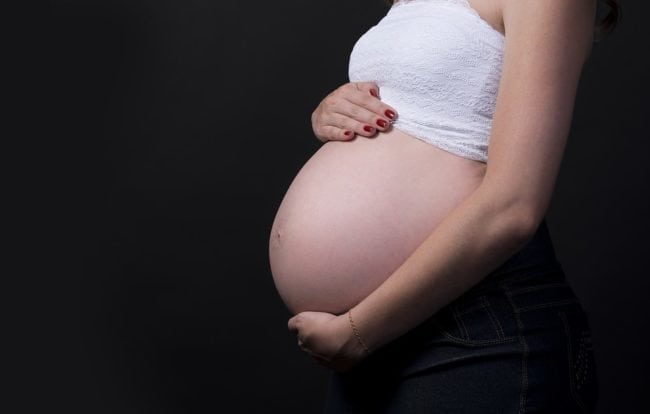
(Creative Commons)
Donor insemination involves using donor sperm. This can be obtained by using an anonymous sperm donor (from a sperm bank), or using a known donor or a friend.
All information below is for babies that are conceived through donor insemination after 6 April 2009, when laws changed affecting the rights of same-sex female couples.
The following rules apply for children conceived through donor insemination on or after 6 April 2009:
- Under UK law a child’s birth mother will automatically be their legal parent when they are born, even if they are not their biological mother
- A child’s second legal parent, at birth, will depend on the circumstances at the time of their conception
- The birth mother’s civil partner or spouse will be considered legal parent, and can be named on the birth certificate, if they were married or civil partners at the time of conception
In the UK, women can inseminate through a UK licensed fertility clinic or at home. Depending on which method you use there are implications regarding legal parenthood.
If a man donates sperm to a female couple who are in a civil partnership or married, when they conceive with donated sperm, they automatically become legal parents of the child – whether they conceive in a UK licensed fertility or outside a UK licensed fertility clinic (ie at home).
This follows changes implemented by the Human Fertilisation and Embryology Act 2008, which sets out who a child’s legal parents will be when they are conceived through artificial insemination.
So, in this situation the biological father would not be considered a legal parent – the non-birth mother will automatically be the second legal parent and will be named as such on the birth certificate.
If the female couple are not civil partners or not married, the rules are different.
If the child is conceived through a UK licensed fertility clinic, the birth mother can sign an agreement through the clinic naming her partner as the child’s second parent, as opposed to the biological father being viewed as the second legal parent.
If the child is conceived outside a licensed fertility clinic (and the couple are not married or in a civil partnership at the time of conception), the second legal parent (under UK law) will be considered the donor father, who will have parental responsibility if he’s registered on the birth certificate.
The birth mother’s partner is able to become a legal parent by applying to adopt, and can also get parental responsibility.
A child can only ever have two legal parents, though it is possible for more than two people to have parental responsibility.
Until February 2013, there was no official guidance on what NHS funding should be offered to same-sex female couples seeking fertility treatment.
Now, National Institute of Clinical Excellence (NICE) guidance offers NHS trusts best practice for the assessment and treatment of people with fertility problems.
NICE guidelines explain what same-sex female couples can expect when looking for fertility treatment – head here to find out more about funding for same-sex female couples.
The same rules apply in Northern Ireland.
Related: Is Harry Styles bisexual? Here are all the clues
Benefits and taxes

(20th Television)
All married couples, or those in civil partnerships, regardless of sexual orientation or gender identity are assessed in the same way for tax and benefits.
This includes income tax, married couple’s allowance, inheritance tax, capital gains tax, and tax credits.
Same-sex married couples and civil partners are jointly liable to pay their council tax, as are opposite-sex couples.
For same-sex married couples, civil partners and opposite-sex married couples, it is the same regarding income-based Jobseekers Allowance (JSA), income-based Employment and Allowance (ESA), income support, council tax benefit and housing benefit.
Unmarried same-sex couples have the same rights as opposite-sex couples when it comes to benefits and taxes.
If unmarried couples want to protect themselves, they can make wills and sign written agreements.
Stonewall also recommends they consider having a Lasting Power of Attorney for finance/property and health/welfare as well as Advance Directives.
For example, if one person in the relationship loses capacity to manage their own affairs, unmarried people have limited rights.
Pensions
Pension provision is the same for same-sex married couples, civil partners, and straight married couples – bar schemes which pay benefits to the surviving partner of a couple in the event of the death of the pension holder.
Prior to the Civil Partnership Act in 2004, there was no way for a same-sex couple to have a legally recognised relationship – which created disparity in the way survivor pension schemes are calculated for same-sex couples.
Current pensions law leaves some married gay and lesbian couples worse off than their heterosexual counterparts – because same-sex couples have only been recognised in the eyes of the law since civil partnerships were introduced in 2005.
The loophole in the Equality Act means that while elderly straight couples have had decades to accrue rights to partner benefits on private pension plans, a number of plans only offer entitlements from 2005 onwards to gay and lesbian couples.
Last year, 62-year-old John Walker challenged the rules that mean he would only be entitled to pass £500 of his final salary pension on to his husband and partner of more than 30 years when he dies – compared to £41,000 that a female widow could claim.
Same-sex couples outraged at the ‘short-changing’ have long been trying to re-address the rules, and after a defeat at the Court of Appeal, Walker took his case to the Supreme Court – and won.
Related: A mum finally accepted her bisexual daughter because of Love, Simon and it’s gone viral
Northern Ireland
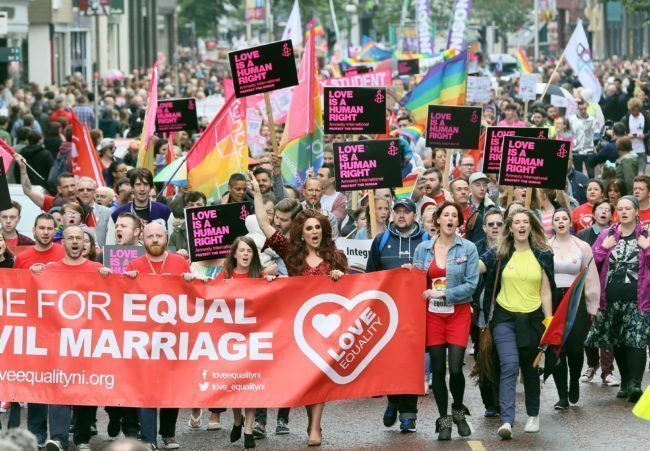
(PAUL FAITH/AFP/Getty)
Northern Ireland is the only part of the UK that still bans same-sex couples from marrying, as the ultra-conservative Democratic Unionist Party has employed peace process powers to block equal marriage bills in the region.
A recent poll found that fewer than one in five people in Northern Ireland are opposed to equal marriage – despite a political stalemate that has left gay people without marriage rights for years.
Explainer: Why doesn’t Northern Ireland have equal marriage yet?
Following the collapse of Northern Ireland’s devolved power-sharing government, campaigners say the responsibility for bringing about equal marriage now lies with the UK Parliament.
UK Prime Minister Theresa May recently said the issue should wait until the Northern Ireland Assembly is restored, but backbench MPs in Westminster have begun a push for legislation that could bring about equality sooner.
Following the poll, campaigners reasserted pressure on the UK government to introduce equal marriage in Northern Ireland and bring the region into line with the rest of the UK.
In an interview with PinkNews in Westminster, the leader of Sinn Féin in Northern Ireland Michelle O’Neill gave her backing to legislation in Westminster – even though, as republicans, Sinn Féin do not typically recognise the authority of the UK Parliament over Northern Ireland.
However, civil partnerships have been available to same-sex couples in Northern Ireland since 2005, when the UK Parliament passed the Civil Partnership Act 2004.
Civil partners are entitled to the same property rights as married opposite-sex couples, the same exemption as married couples on inheritance tax, social security and pension benefits.
They are also able to get parental responsibility for a partner’s children, and responsibility for reasonable maintenance of a partner and their children, tenancy rights, full life insurance recognition, next of kin rights in hospitals.
As above, civil partnerships can be dissolved. However, in Northern Ireland they cannot be conducted by religious organisations.
Legal information via Stonewall.

